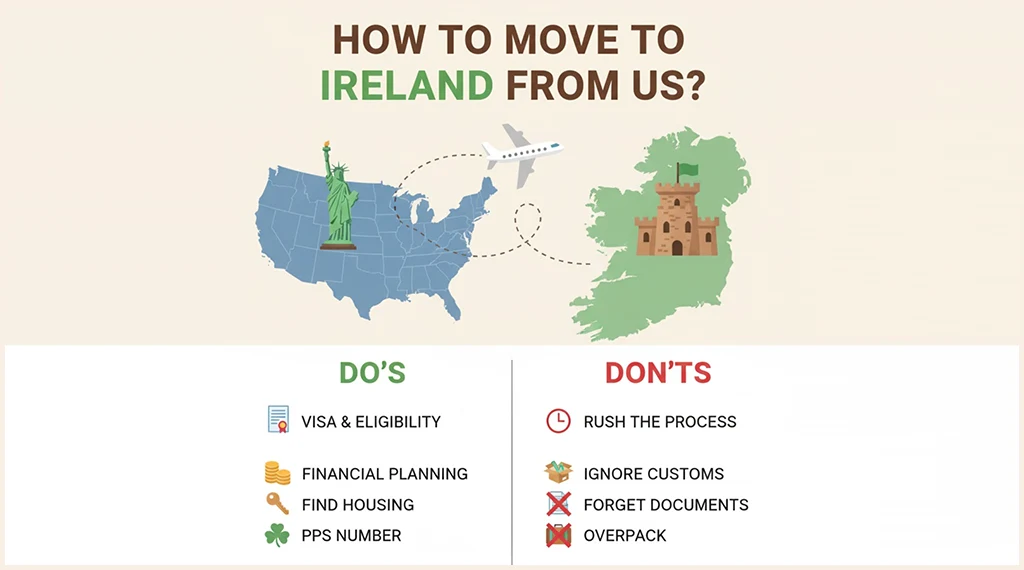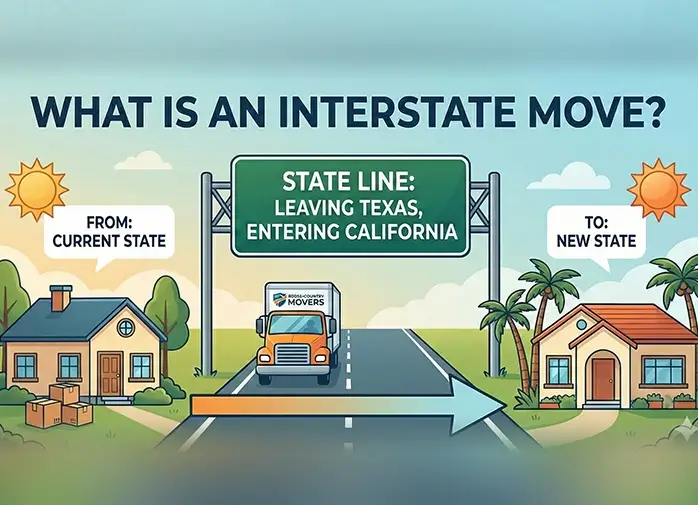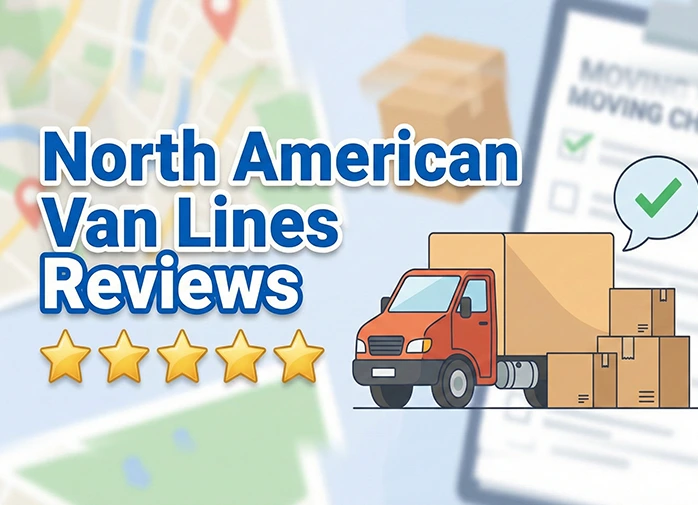Moving to Ireland from the US: The Ultimate Guide

Moving to Ireland from the US is an exciting adventure. The Emerald Isle offers stunning landscapes, rich history, vibrant culture, and a high quality of life. Many Americans are drawn to Ireland for work opportunities, education, or lifestyle changes. However, international relocation is far more complex than moving across states. From visas to shipping your belongings, finding housing, and understanding cultural nuances, careful planning is essential.
This guide will walk you through every step of relocating from the US to Ireland. Whether you’re planning a short-term stay or a permanent move, these tips will help you transition smoothly, avoid surprises, and start your new life in Ireland with confidence.
Why Move to Ireland?
1. Economic Opportunities
Ireland is known for its robust economy, particularly in technology, pharmaceuticals, and finance. Dublin, Cork, and Galway are home to multinational companies like Google, Facebook, Pfizer, and Apple. Job opportunities for skilled professionals are plentiful, and the country’s pro-business environment makes it attractive for entrepreneurs and remote workers.
2. Quality of Life
Ireland offers a high quality of life, with excellent public services, low crime rates, and access to healthcare. The country’s natural beauty — rolling hills, cliffs, lakes, and coastal towns — provides countless opportunities for outdoor activities. Small towns and villages offer close-knit communities, while cities combine history with modern amenities.
3. Education and Healthcare
Ireland has an excellent education system, from primary schools to world-renowned universities like Trinity College Dublin and University College Cork. Healthcare is accessible through a combination of public and private services. Many expats choose private insurance for added peace of mind, especially during their first year.
4. Culture and Lifestyle
Irish culture is vibrant and welcoming. Traditional music, festivals, sports, and pubs form an essential part of social life. English is the primary language, which eases the transition for Americans. Embracing local customs and traditions helps build connections and integrate into communities.
Preparing for the Move
1. Visas and Residency
Depending on your situation, you may need a work permit, student visa, or residency permit. Some Americans are eligible under programs like Critical Skills Employment Permits or Stamp 4 for long-term residence. Consulting the Irish Naturalisation and Immigration Service (INIS) is essential before making any arrangements.
2. Budgeting and Cost of Living
Ireland’s cost of living is higher than many US cities, especially in Dublin. Budget for rent, utilities, groceries, transportation, and leisure. Currency differences matter — the Euro fluctuates against the US dollar, so plan for conversion rates and international fees.
3. Health Insurance
Healthcare coverage is mandatory. Consider obtaining international health insurance or registering with Ireland’s public health system upon arrival. Research coverage for emergency services, GP visits, and prescription drugs.
4. Banking and Currency
Opening a local bank account simplifies transactions and avoids foreign transaction fees. Some major US banks have Irish partners, but it’s wise to research account types, debit cards, and online banking before arrival.
Finding Accommodation
1. Temporary vs. Long-Term Housing
Most expats start with temporary housing such as serviced apartments, Airbnb, or short-term rentals while searching for permanent accommodation. This approach allows you to explore neighborhoods and find a home that fits your lifestyle.
2. Best Cities for Expats
- Dublin: High-paying jobs, cultural activities, international community.
- Cork: Smaller city, affordable housing, growing tech hub.
- Galway: Creative and artistic environment, scenic coastal living.
- Limerick: Budget-friendly, central location, developing economy.
3. Renting vs. Buying
Renting is more common for new arrivals, offering flexibility and less upfront cost. Buying property is an option if planning a long-term stay, but involves higher costs and additional paperwork.
4. Tips for Apartment Hunting
- Use reliable websites like Daft.ie or Rent.ie.
- Inspect properties in person or via video calls.
- Be ready with references, proof of income, and identification.
Packing and Shipping
1. What to Bring
Bring essentials, sentimental items, and valuables. Ireland has most consumer goods, so furniture and electronics can often be purchased locally.
2. International Moving Companies
Hiring professional movers specializing in international relocation ensures your belongings arrive safely. Compare quotes and services, including customs clearance and insurance.
3. Shipping Methods
- Air Freight: Faster but more expensive, ideal for urgent items.
- Sea Freight: Cost-effective for large shipments but takes longer.
4. Customs and Import Restrictions
Some items, including certain food, alcohol, and plants, are restricted. Check Irish Customs regulations before shipping. Proper documentation avoids delays and extra fees.
Transportation and Getting Around
1. Driving in Ireland
US drivers can use their license for up to 12 months. Vehicle insurance is mandatory. Note that driving is on the left-hand side of the road.
2. Public Transport
Cities have efficient public transport networks — buses, trams, and trains. Dublin offers the Luas tram system, while Ireland’s intercity trains connect major towns.
3. Buying a Car
Owning a car provides flexibility, especially in rural areas. Consider fuel costs, insurance, and parking fees when budgeting.
Settling In
1. Registering with Authorities
Upon arrival, apply for your PPS number (Personal Public Service) to access healthcare, banking, and social services.
2. Banking
Open a local bank account to pay rent, bills, and receive salaries. Most banks require proof of address, identification, and employment documentation.
3. Enrolling Children in Schools
Ireland offers a combination of public and private schools. Research catchment areas and enrollment procedures early.
4. Healthcare Registration
Register with a GP and consider supplemental private health coverage if needed.
Cultural Adaptation
- Learn Irish customs and etiquette — greetings, tipping norms, and social expectations.
- Join expat communities and clubs to meet others.
- Understand Hiberno-English phrases and idioms.
- Respect local laws, including alcohol consumption and driving rules.
Cost Considerations
- Rent: Dublin (€1,800/month avg), Cork (€1,300/month), Galway (€1,200/month).
- Utilities: €100–€200/month.
- Groceries: €300–€400/month for a small family.
- Transportation: Monthly public transport pass ~€140.
- Hidden costs include deposits, insurance, and local taxes.
Budget realistically and include a contingency fund for unforeseen expenses.
Bonus Tips for a Smooth Move
- Time your move outside peak rental seasons.
- Keep multiple copies of all important documents.
- Consider hiring relocation specialists for packing, customs, and transport.
- Network online before arrival through LinkedIn, Facebook expat groups, or forums.
Conclusion
Moving to Ireland from the US is an exciting and rewarding journey, but careful planning is essential. From visas and budgeting to packing, shipping, and cultural adaptation, every step requires attention.
By following this guide, you can ensure a smooth, organized, and enjoyable transition. Professional movers like VanLinesMove make international relocation simpler, taking care of logistics so you can focus on starting your new life in Ireland confidently.
FAQs for Blog
1. Do Americans need a visa to move to Ireland?
Yes, most Americans require a visa, such as a work permit, student visa, or long-term residency permit. Check the Irish Naturalisation and Immigration Service (INIS) for eligibility and application procedures.
2. How much does it cost to move to Ireland from the US?
Costs vary by city and shipment size. Expect international shipping to range from $3,000–$10,000, depending on volume and method. Add flights, temporary housing, and initial living expenses to your budget.
3. Can I drive in Ireland with a US driver’s license?
Yes, US licenses are valid for 12 months. After that, you must apply for an Irish driver’s license. Driving is on the left side of the road, and insurance is mandatory.
4. How long does it take to ship belongings to Ireland?
Air freight takes 1–2 weeks for smaller shipments, while sea freight can take 4–8 weeks depending on departure port and customs clearance.
Categories
- Long Distance Moving154
- Local Moving120
- Commercial Moving40
- Residential Moving34
- Last – Minute Moving25
- Moving Tips & Lifestyle10
- Furniture Moving9
- Moving Tips & How-To Guides8
- Moving services7
- Moving Cost5
- Moving Cost Calculator5
- Moving Costs & Budgeting5
- moving tips4
- Moving companies4
- state to state movers4
- Moving Tips4
- Piano Moving3
- Car Transportation3
- Truck Rental3
- Local Move3
- best moving rates3
- cheap moving companies3
- affordable moving companies3
- full-service movers3
- Moving3
- Moving Cost Guides3
- Moving Tips & Planning3
- Junk Removal2
- Moving Container2
- Senior Moving2
- Senior Relocation Moving Companies2
- Moving Tools2
- Moving Estimates2
- interstate moving2
- College Moving2
- Dorm Moving2
- Tips for moving2
- cross-country move2
- International moving2
- Household moving2
- Long-Distance Moving2
- Relocation Guide2
- Moving Tips & State Guides2
- Heavy Equipment1
- Senior Moving Services1
- office moving1
- office relocation1
- employee relocation1
- Car Transport1
- Vehicle Shipping1
- Car Shipping Services1
- Artificial Intelligence1
- Office Moving Services1
- Commercial Moving Companies1
- Corporate Moving Services1
- Corporate Movers1
- full-service moving companies1
- sustainable moving companies1
- green movers1
- Moving in US1
- Best places to move in 20251
- 2025 moving1
- Full-Service Moving Companies1
- College moving services1
- Moving to College1
- Moving Season1
- Spring Moving1
- donate1
- sell1
- Movers in California1
- Movers in Studio City1
- Moving to California1
- Laws about Moving into California1
- Moving Laws1
- House moving1
- packing1
- cheap moving ways1
- Moving guide1
- moving across countries1
- international relocation program1
- move out cleaning1
- right packing supplies1
- pack while moving1
- Apartment moving1
- PODS1
- moving out1
- state to state move1
- California movers1
- Truck Rental1
- US Territory Relocation1
- International Moving1
- Shipping & Moving Tips1
- Moving Budget Guide1
- Relocation Guides & Incentives1
- Moving Tools & Equipment Guides1
- Moving Services & Options1
- Moving Tips & How-To Guides1
- Moving Day & Settling In1
- Mobile Home Moving1
- Moving Guide & Tips1
- Moving Tips & State Comparisons1
- Moving Tips & City Guides1
- Moving Tips & Cost Guides1
- Long-Distance Moving Tips1
- Moving Tips & Financial Planning1
- Moving Tips & Home Preparation1
- Vehicle Shipping & Auto Transport1
- Marketing & Lead Generation1
- International Moving Guides1
- Moving Costs1
- San Francisco Moving Guide1
- NYC Moving1
- Local Movers1
- Budget Moving1
- Student Moving1
- Affordable Moving1
- Specialty Moving Guides1
- Local & Long-Distance Moving1
- Boston Moving Guide1
- Europe Relocation Guide1
- Moving Costs & Specialty Moving1
- Cost of Living1
- Relocation1
- International Moving1
- Moving Guides1
- Lifestyle & Relocation1
- State Guides1
- Home Buying Guide1
- Moving Timeline1
- Real Estate Tips1
- Appliance Moving1
- Packing & Preparation1
- Interstate Relocation1
- City-to-City Moving Guide1
- Technology for Movers1
- Moving Reviews1
- Moving Costs & Storage1
- Moving Tips & Equipment Guides1
- Moving Guides & Cost Insights1
- Moving Supplies1
- Packing Tips1
- Home Moving1
Archives
Recent posts
-
.webp)
Plastic Wrap for Moving: The Ultimate Guide to Protecting Your Belongings
February 2026 -

What Is an Interstate Move? Everything You Need to Know Before Moving Across State Lines
February 2026 -

North American Van Lines Reviews: Is It Worth the Cost in 2026?
February 2026 -

Hand Truck vs Dolly: Which One Is Better for Moving and Heavy Lifting?
January 2026

 Local Movers
Local Movers Last-Minute Movers
Last-Minute Movers Junk Removal
Junk Removal Long Distance Movers
Long Distance Movers Piano Movers
Piano Movers Heavy Equipment
Heavy Equipment Commercial Movers
Commercial Movers Moving Container
Moving Container Car Transportation
Car Transportation Furniture Movers
Furniture Movers Truck Rental
Truck Rental Moving Cost Calculator
Moving Cost Calculator Moving Planner
Moving Planner Packing Calculator
Packing Calculator Moving Checklist
Moving Checklist Moving Insurance
Moving Insurance FAQ
FAQ Contact Us
Contact Us Moving Loan
Moving Loan About Us
About Us







